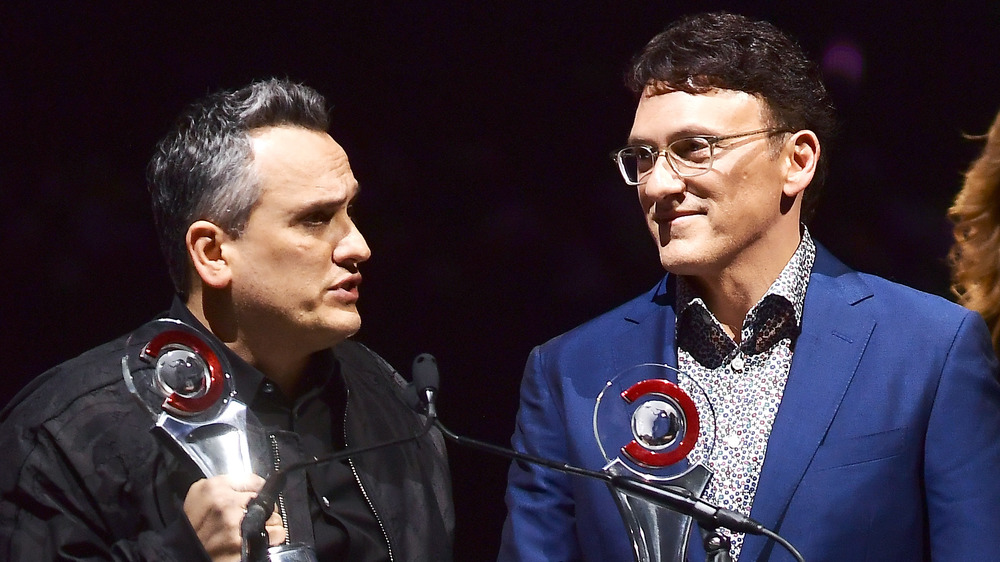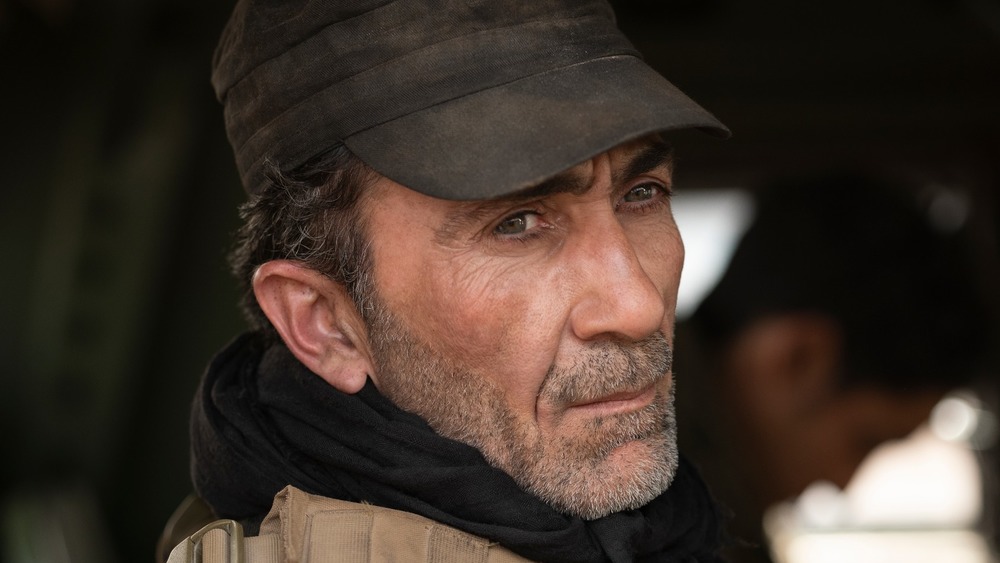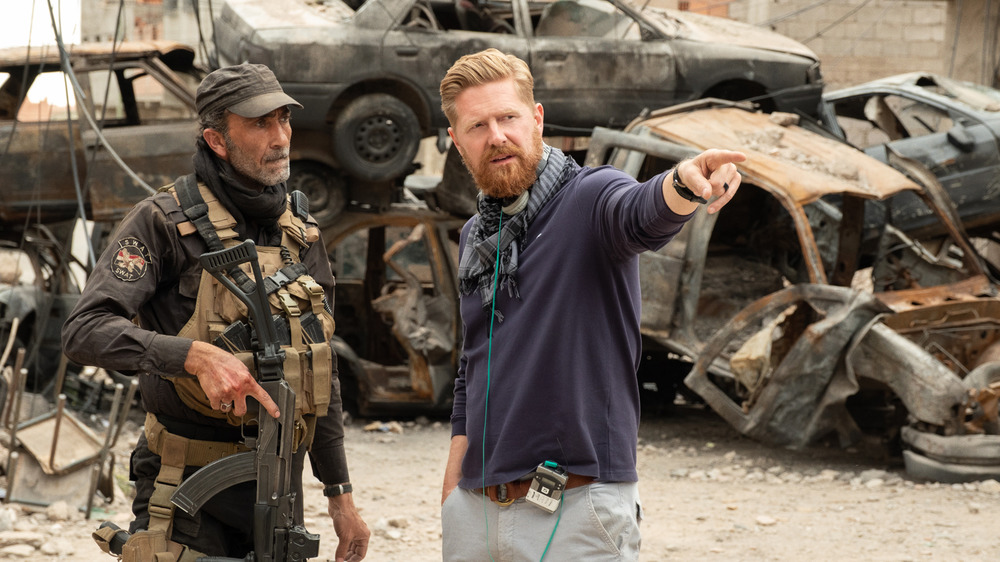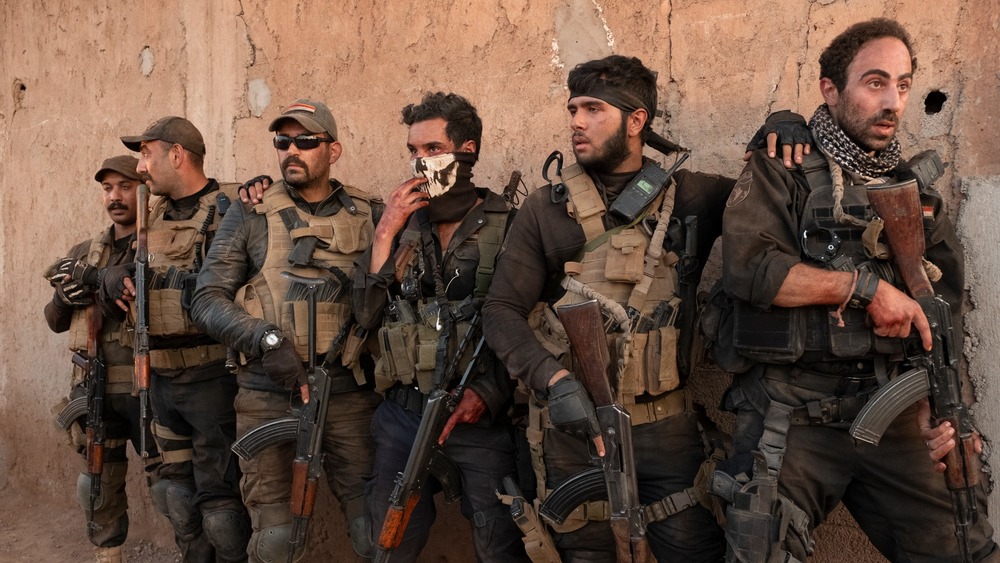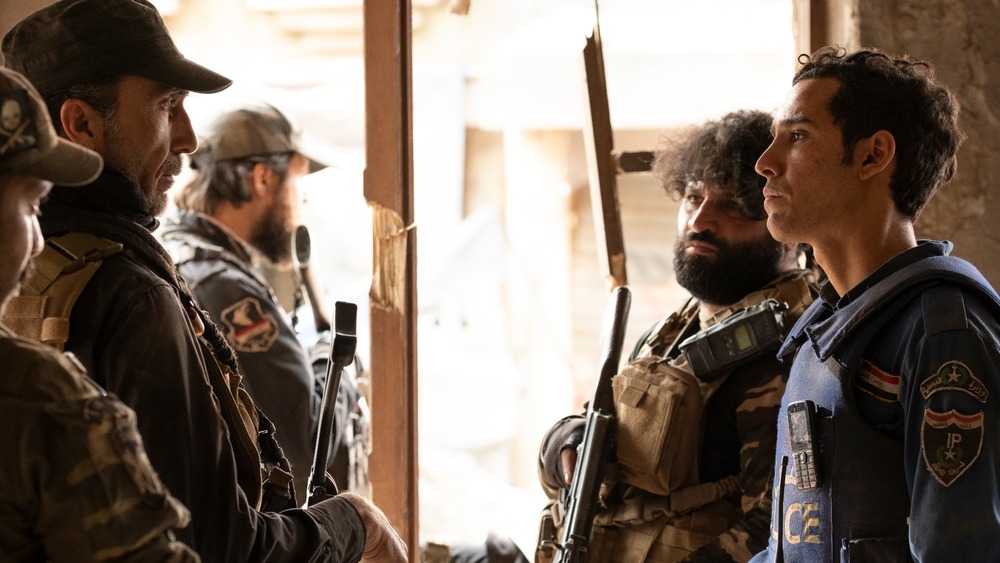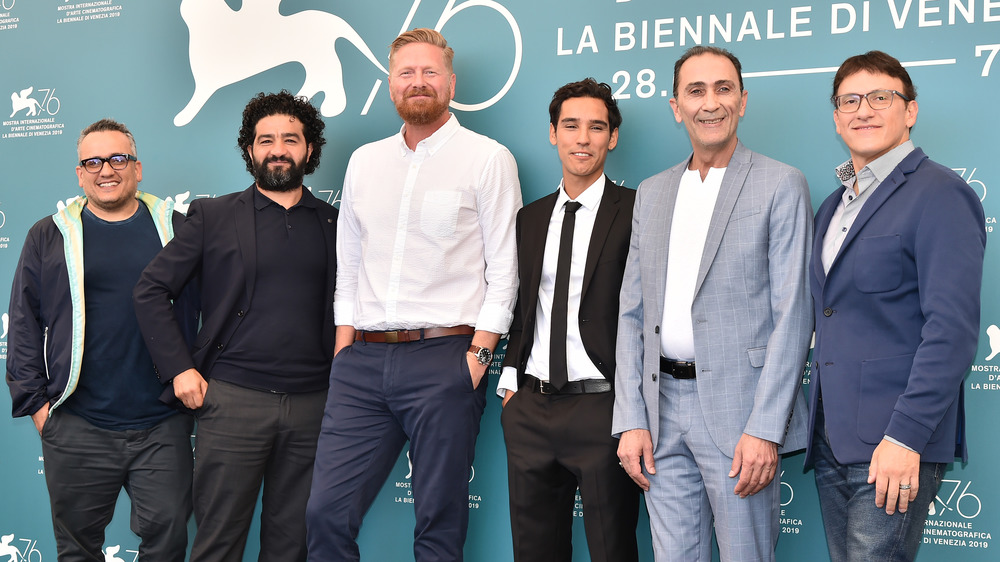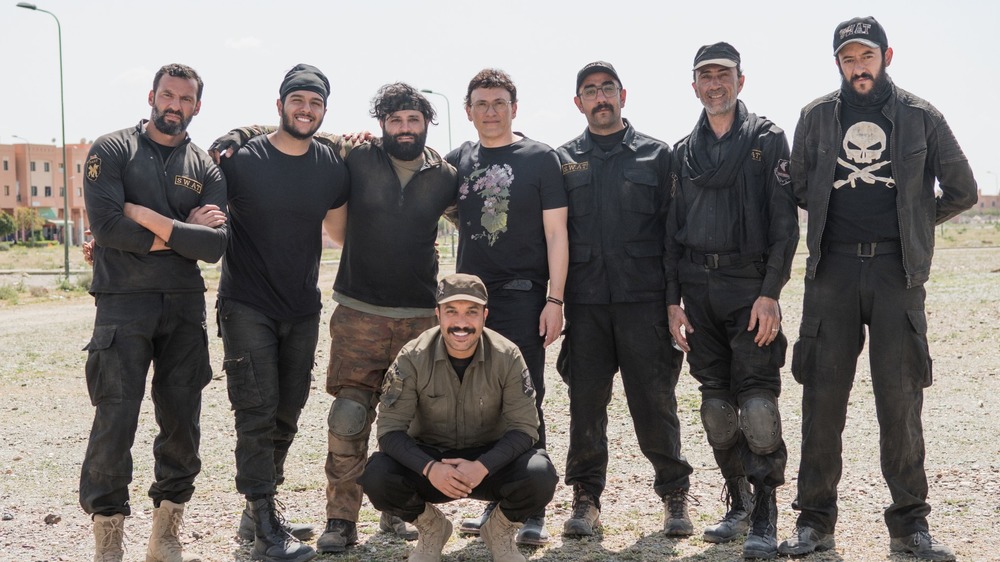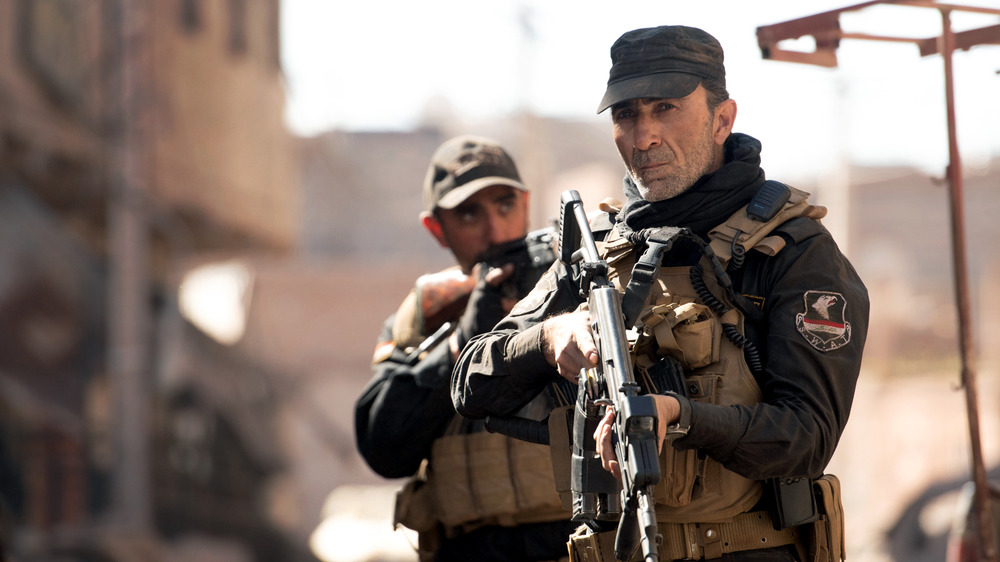Anthony And Joe Russo Talk Mosul, The MCU, And More - Interview
Since their impressive debut in the superhero movie genre directing the 2014 smash Captain America: The Winter Solider, Joe and Anthony Russo have been two of the hottest filmmakers in the business. After that, of course, the brothers racked up three more Marvel Cinematic Universe blockbusters that concluded with Avengers: Endgame, a feat that earned them enough clout to essentially make any sort of film they wish.
The Russos' first big break came under the auspices of director Steven Soderbergh and actor George Clooney, who produced and starred in, respectively, the brothers' feature film debut, the 2002 crime comedy Welcome to Collinwood. The film immediately showed the Russos' promise as storytellers, leading them to directing gigs on such television series as Arrested Development, Happy Endings, and Community, and helming the comedy feature You, Me and Dupree in between.
Post-Avengers: Endgame, which became the highest-grossing film worldwide of all time in 2019, the Russos have turned their sights to paying forward the same types of opportunities they got early in their collective careers. That includes producing films like Mosul, a new Netflix feature film based on journalist Luke Mogelson's 2016 New Yorker article "The Desperate Battle to Destroy ISIS." Telling the true-life story of how an Iraqi SWAT team battled ISIS militants in their city, Mosul stars Suhail Dabbach as the SWAT team's commander, and is written and directed by Matthew Michael Carnahan (screenwriter of World War Z, 21 Bridges).
The Russo brothers discussed Mosul and more in a roundtable interview attended by Looper.
Paying the opportunities forward
Hello, Joe and Anthony. I'm curious to know about the process of choosing your projects. Now for obvious reasons, the groundbreaking success of the Avengers, probably a lot of studios are beating on your doors, hoping you'll direct or produce the next great superhero franchise. But instead, you've chosen to produce a film in a foreign language that does feature superheroes, as far as I'm concerned, with this SWAT team in Mosul. I can't help but think that it's a high priority for you to use that clout that you have to get stories like Mosul told that might not have been told otherwise. Would that be true?
Joe Russo: That's very true. We came into the business through Soderbergh and Clooney. They were our mentors. And Steven Soderbergh discovered us out in Cleveland, Ohio — just two kids who picked up a camera and made a movie and he was about the only person that responded to it. So we feel like we owe a karmic debt to the universe to help other people tell their stories and find their ways into the business as well. And I think, coming off of Marvel, one thing that Steven and George taught us was the "One for you, one for them" mentality. And we did a big one — I would say it's for us as well — but we did a big one for them by doing eight years of work for Marvel, and the opportunity that affords you to help tell stories.
I think we have a responsibility as storytellers to tell more unique stories than Hollywood stories or Anglocentric stories. And we've been fortunate enough to travel the world because of the work we did with Marvel. We have seen amazing regional voices that don't have the same representation that our voices did, and it's critical. You look at the performance of someone like Suhail [Dabbach] in Mosul. He's every bit as good as Tom Hanks at his best, and this is someone that the world hasn't seen on a scale like this before. So, it is an emotional mission of ours to make sure that as we continue to tell big stories that can drive box office and drive business, and we then use the grand capital you get from that to help tell stories of underrepresented cultures.
Guiding a first-time director
You both have written and directed as well as produced. So how has that experience helped you guide, for example, Matthew, who this is his first time directing his own work?
Anthony Russo: It's a great question. Again, I think this goes back to our origin as filmmakers that Joe was speaking about in the sense that we came up through... We were recognized and championed by a fellow filmmaker. It wasn't somebody who was working within the commercial filmmaking system. It was somebody who was approaching us as a fellow filmmaker artist, and it was Steven Soderbergh. I think sometimes artists have the ability to recognize in one another and in one another's work something that's special or something of value that sometimes the commercial filmmaking system won't recognize and won't necessarily foster because it doesn't fit cleanly into what it is. And I think that this goes back to your original question as well. We look at it as our responsibility to use our unique sensibilities to look at other artists, to look at other stories that we can identify as special and needing to be told or needing to be supported and put our energy into that.
So I think it does come from the fact that we are fellow artists. We know what they're going through. We can see when they've got... There's some part of their work that is extremely special and unique, even if the totality of their work is in a level that makes their vision accessible to audiences. So it allows us sometimes to be able to help support and mentor and grow those people as filmmakers or develop those stories into something that become accessible to audiences. And we got to play that role in this movie because even though Matthew Carnahan is one of the most accomplished screenwriters in the business, he had never directed before. This is his directorial debut, and that's a big step. And it's hard to find an opportunity to make that step.
But we had such a fantastic working relationship with him. We knew how talented he was, and we knew how passionate he was about this story in particular. We felt very confident that we could help support him as producers. We could help bring other collaborators to the table like [executive producer] Mohamed [Al Daradji], but also those from all of our craft positions, cinematographer, production designer, etc., we're able to support Matthew in a way that, whatever he didn't know as a director, his collaborative team could support him. So yeah, I do think we are in a unique position to do that kind of thing. And we really enjoy it. We feed off of it, creatively.
Ensuring the authenticity of Mosul's story
Gentlemen, how are you this morning? Thank you for making Mosul. My family is from the Middle East and it was great to hear the Iraqi accent being used. A priest of mine is from Mosul himself. So I would be remiss not to ask on behalf of the indigenous Assyrian Babylonian population of Iraq, how come the Assyrian people were never mentioned in the film since Mosul is built on top of Nineveh? The Nineveh SWAT team is named after the ancient civilization as capital, and the people are still there with their churches being burned down and having survived ISIS. I can talk about relatives and friends that were translators over there and even friends that escaped through Syria whose Iraqi moms are tougher than anything, because they were actually taking video and photos as if it was a family trip, escaping ISIS.
Anthony Russo: Yeah. We are very tuned in to the stories that you're bringing up right now [and they] are massively important, and those are the kind of things we respond most strongly to, those stories that aren't being told. The thing about this film, in terms of Mosul, there are hundreds of movies that can be made about what happened in Mosul, and there should be that number of movies made, because it's the kind of human experience that deserves that kind of exploration.
Even the article, even if you go back to the original article from the New Yorker that this movie is based upon, you can make dozens of movies from simply that article or more. So the objective of the movie wasn't to provide a comprehensive analysis of what Mosul is, there's a lot of complicated ethnic groups and traditions that make up the stew of what modern-day Mosul is, and those groups have all had their own unique experiences in the trauma that's happened there in that country. So I can just say that the story of the people you're talking about have a story that needs to be told, even if it wasn't told in this film.
Joe Russo: There was no intentional exclusion.
Anthony Russo: I think it's incredibly important.
The Russo brothers are intent on elevating genre films
Your production company has already built up a good and exciting reputation for tackling different genres like Assassination Nation, Relic, Mosul, Extraction, and Cherry. Was that a conscious decision for you two to branch out and tackle as many different genres and projects as possible after spending so many years in the studio system? Or is it just picking the best filmmakers with the best ideas and giving them a platform or an opportunity?
Joe Russo: We grew up on genre. We were genre junkies as kids. And I think that there's a way that you can Trojan Horse ideas into genre in a way that you can't with other types of storytelling, because people are compelled to watch because of the genre elements of it. So I think elevated genre is something that we aspire to because you can infuse it with thematics or politics or issues that people wouldn't want to normally address outside of a story. I think if you look at the way that Relic deals with Alzheimer's, you can sit and have a conversation with someone about Alzheimer's, that may be more uncomfortable than the way that film can convey to you a profound message about losing the ones that you love with dignity and grace.
It's the same with Mosul; we're trying to tell a story about an underrepresented culture using genre techniques like you see in traditional war films. This is all true, but if it makes it compulsively watchable to Western audiences so they can empathize with and become part of that story and understand that story, then all the better if it gets more people to watch it and understand it. I think that we don't have a conscious agenda outside of, as you mentioned, "Are we excited by the project? Are we excited by the filmmaker behind the project?" We're excited by what it is trying to say. Each of those movies that you mentioned, in their own right, have their own political agendas with dramatic agendas regarding issues that we feel are important or under-serviced.
Matthew Carnahan's passion to make the film impressed the Russos
Obviously as producers, you have to find films that you're really passionate about to give you that motivation to go from start to finish. So what was it about Matthew's vision that made you really invested in wanting to produce this film?
Joe Russo: Matthew is a very passionate, very emotional artist. And when he gets excited about something or passionate about it, he can't let it go. He's also very political, very politically minded... [it's] incredibly important to him. And this was the story that made me cry when I read it in the New Yorker. When my brother cried, it made Matthew cry. And the three of us said, "This is something that we have to use our lifeline to help get made. And so, like any artists, we respond to other artists who are passionate because it's next to impossible to get a film made and someone has to be the engine behind that. And Matthew was a very gracious engine, including another filmmaker like Mohamed [Al Daradji]. It's really unfortunate that he couldn't participate, but he has some very profound things to say about the film and about his experience as a filmmaker in Iraq and experiencing the cast and the crew and the movie.
But he was very gracious and collaborative and humble and trying to tell the story in the most realistic and authentic way possible by working directly with Mohamed, the former SWAT members and an all-Iraqi cast to do that. And I think it is important. I think something that we would encourage is that we tell each other's stories because it gives us insight into each other. And I think that's in really short supply in the world at the moment. And this was an incredible experience where for Anthony and I and for Matthew, we learned an incredible amount about a part of the world that we had a limited understanding of prior to making this movie.
The Russo brothers purposefully make films out of their comfort zones
A question for both Anthony and Joe. I think any good actor, or any good filmmaker, knows that the craft is a continual learning experience. And I'm wondering for both of you, if Mosul changed your perspective in any way about moviemaking and perhaps since that point — on a future project you're working on or an upcoming production like Cherry, with Tom Holland — if you applied that in any sort of way.
Anthony Russo: Yeah. It's a great question. And I think part of the reason why we do seek to work in areas that we've never experienced before is because number one, we think there are valuable stories to be found everywhere and that need to be told, but on a more personal sort of self-serving level, it really motivates us as artists and pushes us as artists. It's nice to be taken out of your comfort zone because you can't rely on your same old tricks, your same old techniques. You have to really think about new and innovative ways to both understand and translate what you're trying to do. And that is a really exciting place for an artist to be. We love it. There's never a better place as an artist than when your answer is "I don't know."
That's when you know you're in a really good place. Because you're forcing yourself to figure something out that you don't quite understand yourself yet. So yeah, this was an amazing experience. And I can answer the question in so many different ways, but I think just at a simple level, one thing that really resonated with me was the number of cast members, that main SWAT group that played that SWAT team, the number of them that would tell us during production that "You don't understand how important this is to us. Literally, I haven't played a non-terrorist in my career." For as crazy as it sounds, it's real. And the idea that the opportunity that they had to play protagonists, people who are the heroes in the story, was such a rare opportunity and so incredibly valuable and profound for them, both on a personal level and I think what it meant for the culture that they were a part of.
I think that's something we knew instinctively as outsiders. We understood that idea. But to see how it affects somebody on a personal level was really profound and something you never forget. And I think that really helps propel us forward in terms of understanding the importance of being a part of the narrative to every culture around the world and every people around the world — especially those cultures that are often excluded or ignored. So that's something that will always stay with me moving forward from this experience. Joe, I don't know if you have any other thoughts on that.
Joe Russo: No, I'm fine. That was perfect.
The Russos paid attention to every detail
Gentlemen, the primary accent used in the film is the Iraqi dialect, especially from Baghdad. The cast is international, like in the United States, how we even have our own various American accents, Arabic has its own distinct accents. How difficult was it when a shot came out beautifully, but then you realize, "Oh, that's a Jordanian accent that's being used" or "That's a Moroccan accent being used" or that "accent is Tunisian?" Did you have to go back and re-shoot that entire scene? Or would you just dub it over with the Iraqi accent?
Joe Russo: We made the choice to use the Baghdad accent because it was easier for all the actors to get that dialect because it was, as we say, we're pulling from a diaspora. So there were actors coming from all over the world. We had actors from Michigan, so it was easiest in the time that we had to get them to do the Baghdad accent. But we had a lot of people on set paying very close attention, including a dialect coach from Iraq and Mohamed [Al Daradji] were paying very close attention to the way that people spoke. And it's like anything, you're trying to get an American actor to do an English accent or vice versa. There are going to be moments when they don't do it exactly the way that they should. So we wouldn't reshoot. We would loop, and we did go back and do some looping throughout the film to try to get it to stay as cohesive as possible. That was really important to everyone involved. Hopefully, knock on wood, we did a good enough job.
Anthony Russo: Yeah. We knew at the end of the day that we wanted that movie to hold up to an ear like yours, like somebody who understood the subtleties of that. We really wanted the movie to hold up. And we've spent an immense amount of time and effort on that, to be honest with you. All the way through the process, from rehearsals onward to the post process.
Mosul is now playing on Netflix.
